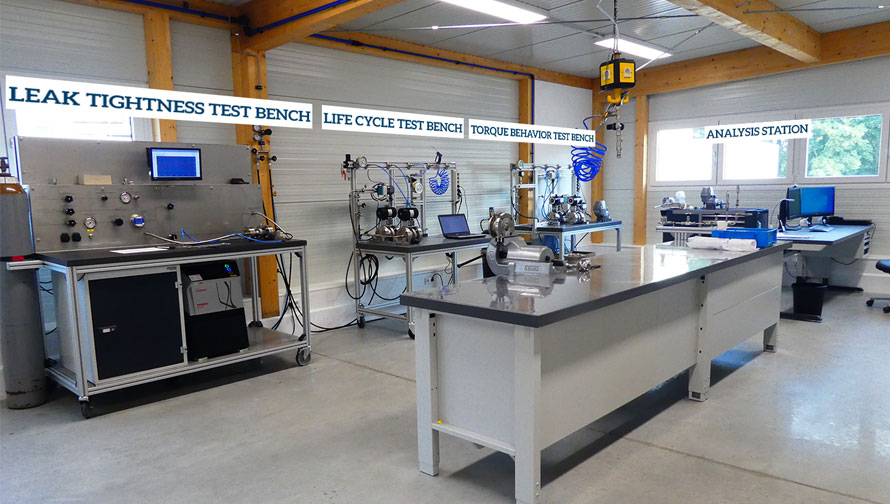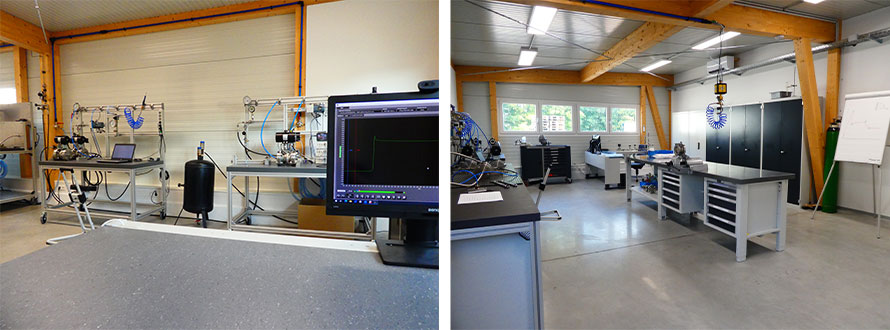

New test laboratory
Leak tightness test bench✔ Life cycle test bench✔ Torque behavior test bench✔ Analysis station✔ TTC✔ Fire Safe Test✔
In addition to the standard tests that continuously accompany series production and manufacturing, more complex tests, such as those required for the development of new products, can now also be carried out in the new KLINGER Schöneberg laboratory. In this respect, the 215 square meters of hall space added last year mean more room for creativity, innovation and a spatial knowledge advantage over competitors.
Independently of series production or tests accompanying production, KLINGER Schöneberg can carry out tests for preliminary developments with a focus on technology scouting, testing and evaluation as well as innovation and patent management. Likewise, an analysis and specification of technical as well as economic requirements, the implementation of new technologies in products, the generation and evaluation of ideas for technical problems and the execution of tests for the verification of development results are carried out.

From left to right: leak tightness test bench, life cycle test bench, torque behavior test bench and the analysis station.
The current qualification of the tightness of shut-off and control devices (a consequence of the new "technical instructions for keeping the air clean" as well as the component testing according to DIN EN ISO 15848-1) is carried out on a test stand specially designed for this purpose. For this purpose, a helium mass spectrometer measures leaks at different pressure and temperature conditions via the service life simulation on the stem seal (stuffing box packing) and the housing seal in a measuring range of 1 x 10-10 mbar*l/s. The test medium used is helium. Helium with a purity of 99.996% is used as the test medium.
In addition to the external tightness, the internal tightness (the so-called tightness in the passage) is also determined here using the pressure decay method and the bubble test. Helium, nitrogen, oxygen or compressed air are available as test media for this purpose.
On another test rig, ball valves as well as actuators are tested with regard to torque behavior over the entire swing angle for service life and reproducibility. The realization of constant actuating times during the test enables the comparability of the results of different friction partners.
Within the scope of life cycle and wear tests, the behavior of ball valves and actuators under application-specific conditions can be analyzed on the third test rig. If required, this so-called life cycle test rig also enables long-term tests lasting several weeks with several 100,000 switching operations. Differential pressure testing, different test media (gaseous, liquid or solids-laden) and temperatures of up to +400° C simulate extreme conditions such as those our products will encounter at some customers.
All test benches are connected to the high-pressure network and can be operated at up to 175 bar and, in special cases, up to 310 bar.

In the new laboratory, ball valves can be tested in the application range of high and low temperature, type tests for the Type Test Certificate (TTC) as well as fire-safe tests can be carried out. If required, testing organizations are called in for monitoring, testing, inspection and certification.
The development of the test laboratory and the successive expansion of capacities and test methods will enable greater innovative strength within the company and faster 'time to market' times for new products to be realized. The department continues to focus on targeted application-oriented research into new technologies and the timely development of innovative products in order to meet customer needs with the most advanced technologies and state-of-the-art solutions. Through the internal networking of the department and the processing of research and development results, the quality standard within KLINGER SCHÖNEBERG GmbH is further raised.
Your contact
- Marcel Gossmann, Business Development Manager / Management Assistent
+49 6126 950 - 268 marcel.gossmann@klinger-schoeneberg.de
